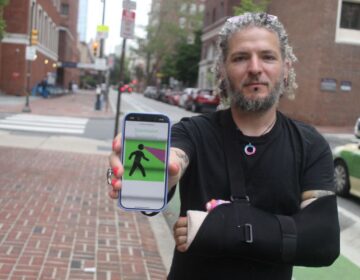Makeshift meth labs in hotels becoming common, and risky
Philadelphia was one of two cities where impromptu methamphetamine labs in hotel rooms got busted over the weekend. Another was found in suburban Boston.
The risky practice is becoming more common, drug enforcers say.
“Unfortunately it’s not that difficult at all,” said Patrick Trainor, a special agent with the federal Drug Enforcement Administration. “We have seen over the past few years a real prevalance of what are referred to as one -ot meth labs, which are also referred to as shake-and-bake labs.”
The rig needed to cook chemicals to make the illegal, addictive stimulant has gotten pretty small and portable, Trainor said.
As small as a plastic soda bottle.
“Anywhere from 16 ounces to a liter,” Trainor said. “What makes these labs particularly dangerous is that you are combining a number of extremely volitile chemicals in an extremely small container, and the reaction is so strong that it produces a very pure form of methamphetamine.”
The Hampton Inn in Philadelphia was evacuated Saturday when an impromptu meth lab was discovered in a third-floor room. A 27-year-old man was charged in the case. Another hotel meth lab, this one in suburban Peabody, outside Boston, was also found. Between the two incidents, nearly 500 hotel guests had to be rousted from their rooms, but no injuries were reported.
Fire and nausea
Trainor says meth cookers like soda bottles because they can expand and contract during the process. But the thin plastic can also fail, with dire results:
“What happens is that these soda bottles often rupture and you get these little pinholes where fire essentially will erupt and we’ve seen cases where they bottles rupture and shoot out a ball of fire sometimes 10 to 15 feet long.”
Meth cooking involves chemicals such as solvents, ether, acids or ammonia. The process, even when no fire occurs, turns a room into a hazardous waste site where even the drywall has to be stripped away.
“It’s not uncommon to find contamination on bedding, linens, mattresses and even sheetrock,” the DEA agent said.
For the unlucky next person booked into a room where a makeshift lab was used, exposure to the chemicals could cause nausea, dizziness or even burns and lung damage.
Trainor says that’s why the meth makers don’t cook at home.
“They are quite conscious of the fact they are not going to use their residences to make this drug,” said the DEA agent.
You don’t have to be a genius to cook meth. Here’s evidence: Police say Matthew Stinson, the man arrested in the Hampton Inn case, registered for the room under his real name.
WHYY is your source for fact-based, in-depth journalism and information. As a nonprofit organization, we rely on financial support from readers like you. Please give today.




